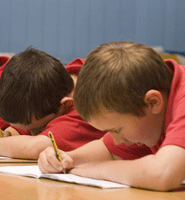Primary-school pupils in England typically do better in key stage 2 English and maths tests when they are taught with more able children. But children who are close to the average of their classmates (at key stage 1) benefit far more from having smarter children in the class than do less able pupils. These are the central findings of new research by Steven Proud from the University's Centre for Market and Public Organisation.
It has been long believed that pupils benefit from being educated in classrooms with brighter students, but identifying the size of this effect and which pupils benefit more has proved difficult until now.
Using data on pupils who were examined at key stage 2 between 2002 and 2006 in every primary school in England that has a comprehensive admissions policy, the research looked at the effect a more able peer group has on individuals’ outcomes at age 11. This was based on attainment in key stage 1 tests taken between 1998 and 2002.
For English, students who are close to the average of their classmates benefit between 1.3 and 1.6 times as much as those who previously fared less well than their peers.
For maths, the results suggest that those pupils who previously were just below average benefit approximately 2.5 times more than those in the bottom tier of the class.
Speaking about the findings, Dr Proud said:
‘These results suggest that all pupils benefit from an increase in the ability of their peer group. However, some pupils benefit more than others. Depending on the objectives of schooling, these results could carry significant implications for the optimal grouping of children within schools.’
